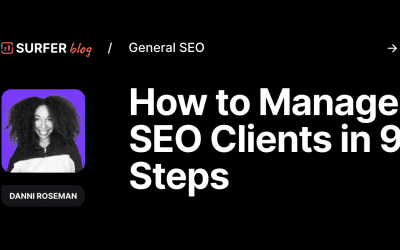So, you’ve got yourself a website, huh? That’s awesome! But now comes the tricky part – building those all-important links. You know, the ones that help your site climb the search engine rankings and get noticed by potential visitors.
But hold on a moment, before you start dropping links left and right, have you thought about whether your link-building strategies are ethical and compliant with search engine guidelines? It’s crucial to play by the rules and not risk getting penalized by search engines.
We’ll explore some effective and ethical link-building strategies and how to ensure they align with search engine guidelines. Let’s dive in!
Learn more about SEO from our Blog
Understanding link-building strategies
Link-building is a crucial aspect of search engine optimization (SEO) that involves acquiring hyperlinks from other websites to your own. The process of link-building creates connections between different web pages, ultimately improving website visibility, organic search rankings, and increasing website traffic.
Ensuring ethical link-building practices
When it comes to link-building, it is essential to adhere to search engine guidelines and avoid black hat techniques. By promoting quality and relevant content, you can ensure that your link-building strategies are ethical and compliant with search engine guidelines.
Adhering to search engine guidelines
To maintain ethical link-building practices, it is crucial to understand and follow the guidelines set by search engines such as Google. These guidelines provide a framework for creating links that are seen as valuable and genuine by search engines. Staying informed about updates and changes in these guidelines is also essential to ensure compliance.
Avoiding black hat techniques
Black hat techniques refer to manipulative practices that violate search engine guidelines and aim to deceive search engines for quick ranking gains. Engaging in such tactics can result in severe penalties for your website’s visibility and authority. It is essential to stay away from link schemes, paid links, link farms, or any other automated link-building practices that violate search engine guidelines.
Promoting quality and relevant content
One of the best ways to ensure ethical link-building is by focusing on creating high-quality and relevant content. When your content is valuable and informative, other websites are more likely to naturally link back to your pages. By prioritizing user experience and offering content that is genuinely helpful to your target audience, you can earn natural and organic backlinks that contribute to your website’s authority and reputation.
1. Definition of link-building
Link-building involves the process of acquiring hyperlinks from other websites to your own. These hyperlinks, also known as backlinks, serve as digital connections, leading users from one web page to another. The goal of link-building is to establish these connections strategically to improve a website’s visibility, authority, and overall performance in search engine rankings.
2. Importance of link-building for SEO
Link-building plays a crucial role in SEO and offers several benefits for websites. Here are some key reasons why link-building is essential for improving your website’s performance:
Enhancing website visibility and authority
When other reputable websites link to your content, it signals to search engines that your website is trustworthy and valuable. As a result, search engines consider your website to be more authoritative, improving its visibility in search results. The more high-quality backlinks your website earns, the more likely it is to be seen as an authority in your industry or niche.
Improving organic search rankings
Backlinks are a vital factor that search engines consider when determining a website’s relevance and credibility. Websites with a stronger backlink profile are more likely to rank higher in organic search results. By implementing effective link-building strategies, you can increase the number and quality of backlinks pointing to your website, resulting in improved rankings for targeted keywords.
Increasing website traffic
Link-building directly influences website traffic by driving referral traffic from other websites. When users come across a backlink on another website that leads to your content, they are likely to click on it and visit your website. This referral traffic can be highly valuable, as it brings in new visitors who may become potential customers, readers, or subscribers.
3. Types of link-building strategies
There are various link-building strategies that you can employ to acquire backlinks. These strategies help you build connections with other websites and improve your website’s authority. Here are some common types of link-building strategies to consider:
Guest blogging and contributor articles
Guest blogging involves writing and publishing content on other websites within your industry or niche. By providing valuable content as a guest author, you can earn backlinks to your website within the article or author bio. This strategy allows you to tap into the existing audience of the host website and gain exposure to new readers.
Broken link-building
Broken link-building is a technique that involves finding broken links on other websites and offering them a replacement link to your content. By helping webmasters fix broken links, you can earn a backlink in return. This strategy benefits both parties, as the webmaster gets a working link, and you gain a valuable backlink.
Resource page link-building
Resource page link-building involves finding relevant resource pages on other websites and requesting to have your content included as a valuable resource. These resource pages typically curate helpful links and information for a specific topic or industry. By having your content featured on these resource pages, you can earn high-quality backlinks and drive targeted traffic to your website.
Infographic outreach
Infographic outreach involves creating visually appealing infographics that contain valuable information or data. You can then reach out to other websites or bloggers within your industry and offer them the infographic for free in exchange for a backlink. Infographics are highly shareable and can attract backlinks from websites looking to provide valuable and engaging content to their audience.
Link reclamation
Link reclamation is the practice of finding mentions or references to your brand or website on other websites that do not currently link to you. By reaching out to these websites and requesting them to add a link to their existing mention, you can reclaim lost opportunities for valuable backlinks. This strategy helps you turn brand mentions into backlinks, boosting your website’s authority.
4. Adhering to search engine guidelines
Maintaining ethical link-building practices involves understanding and adhering to search engine guidelines. Here’s how you can ensure compliance with these guidelines:
Understanding search engine guidelines
It is crucial to familiarize yourself with the specific guidelines set by search engines, especially Google, as it dominates the search market. These guidelines outline acceptable practices for creating and acquiring backlinks, ensuring that your link-building efforts align with search engine expectations.
Staying informed about updates and changes
Search engine guidelines evolve over time as search engines adapt to combat manipulation and provide users with the best search experience. It is important to stay informed about any updates or changes in these guidelines, as they may impact your link-building strategies. Regularly checking search engine announcements, webmaster forums, and industry blogs will help you stay up-to-date with the latest guidelines.
Following best practices
To ensure ethical link-building, it is advisable to follow industry best practices. These practices involve creating valuable and informative content, using natural anchor text, focusing on relevant and authoritative websites, and avoiding any practices that may be seen as manipulative or deceptive. By following best practices, you can build a strong and sustainable backlink profile that complies with search engine guidelines.
5. Avoiding black hat techniques
When it comes to link-building, it is crucial to avoid black hat techniques that violate search engine guidelines. Here are some practices you should steer clear of:
Not engaging in link schemes or manipulation
Link schemes involve artificial methods of acquiring backlinks with the aim of manipulating search engine rankings. These can include buying links, participating in link networks or exchanges, or using automated link-building software. Engaging in link schemes is a clear violation of search engine guidelines and can result in severe penalties for your website.
Avoiding paid links
Purchasing links from other websites solely for the purpose of improving your backlink profile is considered a black hat technique. Paid links are typically low-quality and manipulative, as they do not provide genuine value to users. Search engines heavily penalize websites that engage in such practices, so it is important to rely on organic and earned backlinks instead.
Not participating in link farms or automated link-building
Link farms are websites or networks solely created for the purpose of hosting thousands of irrelevant and low-quality links. These link networks exist solely to manipulate search engine rankings and provide no value to users. By avoiding any association with link farms or automated link-building techniques, you can ensure that your link-building practices remain ethical and in line with search engine guidelines.
6. Promoting quality and relevant content
One of the most effective ways to maintain ethical link-building practices is by prioritizing the creation of quality and relevant content. Here’s how you can do it:
Creating valuable and informative content
When you create valuable content that addresses the needs and interests of your target audience, other websites are more likely to link to it naturally. By consistently publishing high-quality articles, blog posts, videos, or other forms of content, you can attract organic backlinks and establish your website as a valuable resource.
Focusing on user experience
User experience should be at the forefront of your content creation and website optimization efforts. By providing a seamless and engaging experience for your visitors, you increase the likelihood of them sharing your content and linking to it. User-friendly navigation, fast page loading times, and mobile responsiveness all contribute to a positive user experience, making your website more link-worthy.
Earning natural and organic backlinks
By producing valuable content and focusing on user experience, you increase your chances of earning natural and organic backlinks. When other websites find your content useful and relevant, they are more likely to link to it, citing it as a valuable resource for their own audience. Earning these natural backlinks not only improves your website’s authority and visibility but also ensures that your link-building practices remain ethical and compliant with search engine guidelines.
In conclusion, understanding and implementing effective link-building strategies are essential for improving your website’s visibility, authority, and overall performance in search engine rankings. By ensuring ethical practices, adhering to search engine guidelines, and promoting quality content, you can establish a strong and sustainable backlink profile that contributes to the long-term success of your website. Remember, ethical and compliant link-building is the key to building a reputable online presence.









